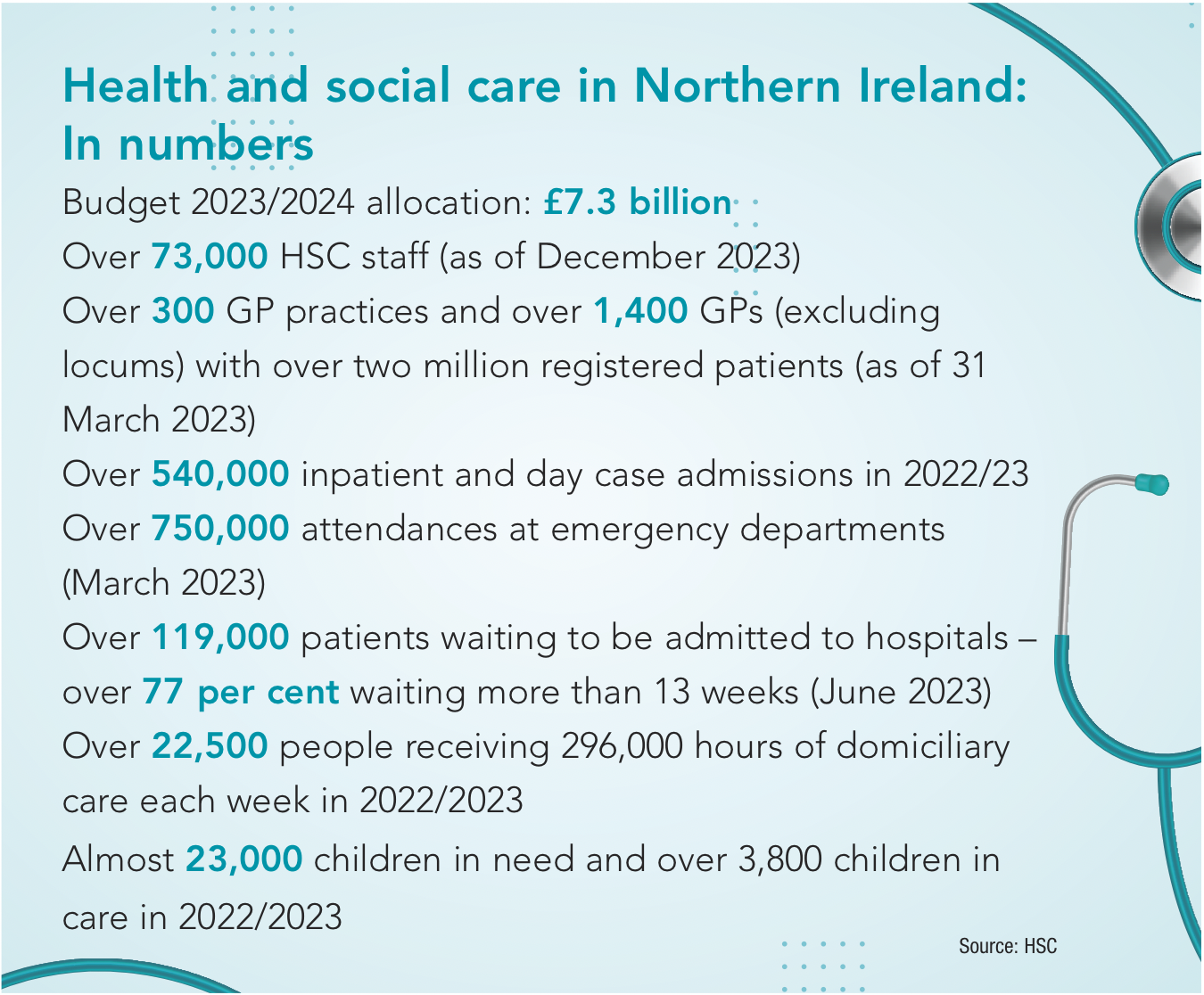Towards a more integrated social care system

In May 2024, the Health and Social Care (HSC) announced that it would broaden care service provision through the integrated care model, unique to Northern Ireland.
An integrated model is a single, joined-up system, based on bringing different parts of the health and social care system together with others who have a role in the wellbeing of the Northern Ireland population to understand what is needed, and how we can best deliver that with the resources we have.
In a review in June 2024, the British Medical Association (BMA) asserted that the significant pressures in social care in Northern Ireland is “a direct result of inadequate resourcing”.
The BMA adds that “there does not appear to be a mechanism to capture and disaggregate spending on social care, despite the integrated structure”.
Aiming to overcome challenges such as rising demand, resource constraints, and significant health inequalities, the Integrated Care System (ICS) Framework shifts away from traditional, fragmented healthcare models towards a collaborative and population-focused system.
The ICS Framework emphasises the roles of preventive care, early intervention, and empowering communities in their health management. A key priority is to reduce health inequalities by targeting social determinants such as socioeconomic status and environment. This framework is anchored in a population health approach, which aims to enhance the wellbeing of entire communities rather than solely focusing on individual health outcomes.
Structurally, the ICS Framework operates through five area integrated partnership boards (AIPBs), each aligned with health and social care trust areas. These boards consist of representatives from various sectors, including HSC trusts, GPs, pharmacies, local councils, and the voluntary sector. AIPBs will create localised health and wellbeing plans based on a population health needs assessment, ensuring resources are directed toward the most pressing needs within communities. They work closely with the Strategic Planning and Performance Group (SPPG) and the Public Health Agency (PHA) to align with regional priorities while maintaining local responsiveness.
At the regional level, the ICS Framework Partnership Forum aims to foster coordination across AIPBs and identifies opportunities for broader collaboration. This body provides AIPBs with strategic guidance and enables shared learning and best practice exchange, promoting a cohesive approach to addressing common challenges and scaling effective solutions across Northern Ireland.
The framework’s governance model ensures that each partner organisation maintains its statutory responsibilities while promoting accountability through outcome-based metrics tied to the overarching Strategic Outcomes Framework (SOF). The SOF guides long-term population health goals, while the System Oversight Measures (SOMs) offer short-term performance metrics to ensure progress toward these outcomes.
Social Care Collaborative Forum: Delivery Plan 2024/2025
The 2024/2025 Delivery Plan, published in July 2025 by the Social Care Collaborative Forum – a collaboration between the Department of Health and the Northern Ireland Social Care Council – is grounded in three primary themes: workforce sustainability, innovative care models, and improved commissioning and contracting. These themes inform each workstream’s actions and objectives, balancing immediate, actionable reforms with foundational steps for a robust future social care system.
1. Workforce sustainability: The social care sector’s workforce challenges are well-documented, from recruitment hurdles to retention challenges exacerbated by Covid-19 pandemic pressures. The action plan’s workforce initiatives include implementing a new Social Care Workforce Strategy to guide workforce planning over the next decade, offering clear career pathways and opportunities for ongoing professional development. Efforts also include expanding international recruitment and enhancing support for foreign-trained staff, aiming to alleviate critical workforce gaps by March 2025.
2. Innovative care models: Recognising the need for capacity expansion, the SCCF is pioneering new models of home care delivery that go beyond traditional task-based approaches. A statutory digital home care solution is set for completion by December 2024 across all trusts, promising efficiencies that could significantly reduce delays in service delivery. Additionally, the action plan aims to advance a regional brokerage system to streamline independent sector home care provision, facilitating quicker response times across trust boundaries.
3. Enhanced commissioning and contracting: Ensuring value and consistency in social care services is a central focus. By December 2024, the Department of Health aims to complete a comprehensive review of care home contracts, aligning standards with recent legislative and operational changes. The action plan further underlines that preparation is underway for pre-procurement processes to facilitate streamlined, regionally consistent contracts that trusts can deploy starting in 2025. This reform aims to offer clearer contractual guidelines for providers, including potential VAT reclaim facilitation for restructuring independent sector providers.
Speaking in the Assembly in July 2024, Health Minister Mike Nesbitt MLA emphasised the critical role of integrated care in transforming healthcare quality and health outcomes.
He stated: “We need to reorganise hospital services and how we will manage our hospital system as an integrated network. This requires a shift from viewing individual hospitals as discrete units to embracing the idea of a network of interdependent hospitals.”






